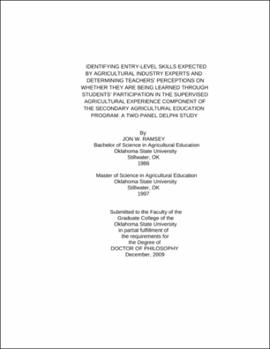| dc.contributor.advisor | Edwards, M. Craig | |
| dc.contributor.author | Ramsey, Jon W. | |
| dc.date.accessioned | 2013-11-26T08:22:21Z | |
| dc.date.available | 2013-11-26T08:22:21Z | |
| dc.date.issued | 2009-12 | |
| dc.identifier.uri | https://hdl.handle.net/11244/6569 | |
| dc.description.abstract | Scope and Method of Study: The population of this study was composed of all secondary agricultural education teachers and State FFA Proficiency Award sponsors (i.e., agricultural industry experts) in the state of Oklahoma during 2009. This study was descriptive in nature and employed a survey research design utilizing a modified Delphi technique that included three rounds of data collection. | |
| dc.description.abstract | Findings and Conclusions: A majority of panelists who completed the instrument were male and Caucasian. Most of the panelists reported participation in supervised agricultural experiences (SAEs) or 4-H projects during their youth. Agricultural industry experts reached "consensus of agreement" on 60 entry-level technical skills that should be learned by students participating in SAEs, with regard to their future employment in various agricultural sectors. Secondary agricultural education teacher panelists reached "consensus of agreement" on 161 entry-level technical skills that should be learned by students who participate in the SAE component of the secondary agricultural education program. The panels were most similar regarding the highest number of skills reaching "consensus of agreement," by career pathways, for Animal Science, 28 and 31 and Agricultural Communications, 29 and 13, teacher and industry panelists respectively. These findings support Roberts' and Ball (2009) content-based model of teaching agricultural education. Specifically, identifying entry-level technical skills, per the seven career pathways for the Agriculture, Food and Natural Resources Career Cluster, supports the Agricultural Instruction and Skill Acquisition component of the content-based model proffered by Roberts and Ball. Results of this study should be shared with all stakeholders concerned about the role of SAEs in secondary agricultural education in the 21st century. More studies are needed to inform further the development of an SAE model that would facilitate students' job preparedness for entry into the agricultural industry in Oklahoma. | |
| dc.format | application/pdf | |
| dc.language | en_US | |
| dc.rights | Copyright is held by the author who has granted the Oklahoma State University Library the non-exclusive right to share this material in its institutional repository. Contact Digital Library Services at lib-dls@okstate.edu or 405-744-9161 for the permission policy on the use, reproduction or distribution of this material. | |
| dc.title | Identifying entry-level skills expected by agricultural industry experts and determining teachers' perceptions on whether they are being learned through students' participation in the supervised argricultural experience component of the secondary agricultural education program: A two-panel Delphi study | |
| dc.contributor.committeeMember | Leising, James G. | |
| dc.contributor.committeeMember | Key, James P. | |
| dc.contributor.committeeMember | Harris, Ed | |
| osu.filename | Ramsey_okstate_0664D_10673.pdf | |
| osu.accesstype | Open Access | |
| dc.type.genre | Dissertation | |
| dc.type.material | Text | |
| dc.subject.keywords | agricultural education | |
| dc.subject.keywords | career clusters | |
| dc.subject.keywords | career pathways | |
| dc.subject.keywords | entry-level skills | |
| dc.subject.keywords | ffa | |
| dc.subject.keywords | supervised agricultural experi | |
| thesis.degree.discipline | Agricultural Education | |
| thesis.degree.grantor | Oklahoma State University | |
